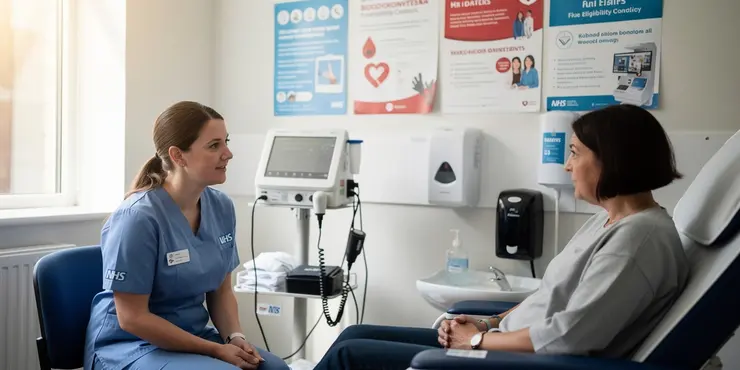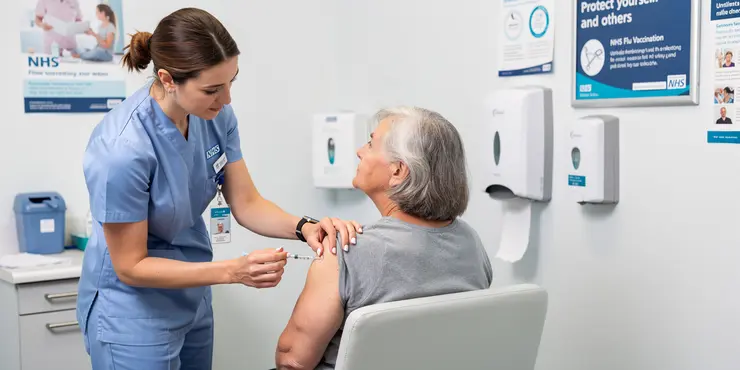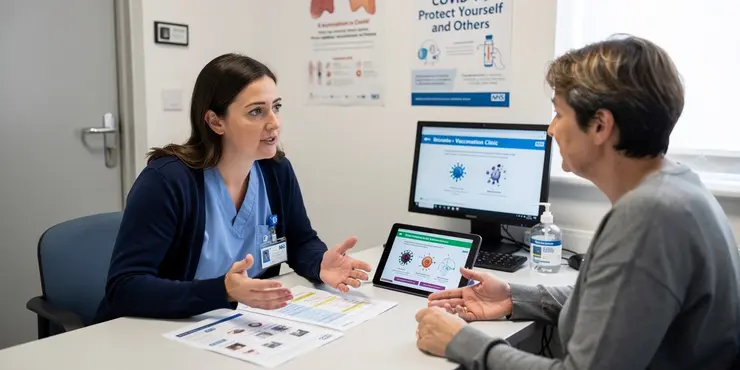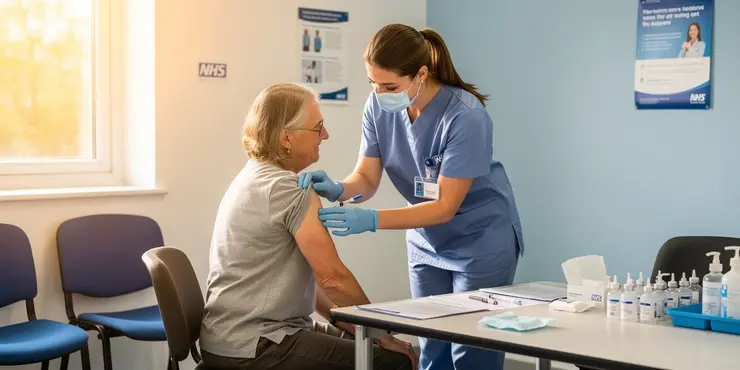
Find Help
More Items From Ergsy search
-
What is a COVID-19 variant?
Relevance: 100%
-
What is the Covid-19 Stratus variant?
Relevance: 96%
-
How are COVID-19 variants detected?
Relevance: 96%
-
How do COVID-19 variants arise?
Relevance: 91%
-
Do new variants affect COVID-19 testing?
Relevance: 90%
-
Where can I learn about real Covid-19 variants?
Relevance: 89%
-
What is the process to identify a new Covid-19 variant?
Relevance: 86%
-

How do scientists name new Covid-19 variants?
Relevance: 86%
-

How can I protect myself from new COVID-19 variants?
Relevance: 85%
-

Are new COVID-19 variants more dangerous?
Relevance: 84%
-

Do vaccines work against new COVID-19 variants?
Relevance: 84%
-
How often do new COVID-19 variants emerge?
Relevance: 84%
-

How can I protect myself from Covid-19 variants?
Relevance: 83%
-

Should I get vaccinated if I already had COVID-19?
Relevance: 76%
-

What sources should I consult for information on Covid-19?
Relevance: 74%
-
Does the flu vaccine protect against COVID-19?
Relevance: 71%
-
Can the COVID jab give me COVID-19?
Relevance: 67%
-

Can COVID-19 be transmitted through blood transfusions?
Relevance: 66%
-

Will getting the flu jab protect me against COVID-19?
Relevance: 65%
-
Does travel insurance cover COVID-19 related issues?
Relevance: 65%
-
What are the COVID-19 travel restrictions for traveling to Spain?
Relevance: 64%
-

Breathlessness after COVID-19 - helpful techniques
Relevance: 62%
-
Can air physiotherapy help with COVID-19 recovery?
Relevance: 62%
-

Are children more affected by new variants of COVID?
Relevance: 59%
-

What are the Nimbus and Stratus variants of Covid?
Relevance: 58%
-
New Covid Variant Strains
Relevance: 56%
-

Can new variants cause reinfection?
Relevance: 56%
-

Are new variants more transmissible?
Relevance: 56%
-

Is there concern about new hypothetical variants like Nimbus and Stratus?
Relevance: 52%
-

Is the Nimbus variant more contagious?
Relevance: 46%
-
What are some well-known COVID-19 variants?
Relevance: 45%
-
Are the symptoms different with new COVID-19 variants?
Relevance: 45%
-

What would happen if the Nimbus variant existed?
Relevance: 45%
-

Should I be worried about new variants?
Relevance: 43%
-

Do vaccines protect against the Stratus variant?
Relevance: 41%
-

when will i need my next COVID jab?
Relevance: 41%
-
Can current treatments handle new COVID-19 variants?
Relevance: 40%
-
What is being done globally to track COVID-19 variants?
Relevance: 40%
-

Are COVID jabs safe?
Relevance: 38%
-
How do COVID jabs work?
Relevance: 38%
Introduction
The global COVID-19 pandemic has resulted in the emergence of new variants of the virus. For those living in the UK, staying informed about these variants is crucial to understanding the evolving situation and adopting necessary precautions. The availability of reliable and accurate information from trusted sources is essential for maintaining public health and safety. Here are some key resources where you can learn about real COVID-19 variants.
Official Government Websites
The UK government provides comprehensive information on COVID-19, including data on variants, through their official website. The GOV.UK site publishes updates on the status of known variants, advice on safety measures, and public health guidelines. The site is frequently updated to reflect the latest scientific findings and health advisories. It is a reliable source for anyone seeking straightforward, factual information on COVID-19 variants within the UK context.
Public Health England (PHE)
Public Health England, soon transitioning to the UK Health Security Agency, has been at the forefront of monitoring and studying COVID-19 variants. Their updates provide insights into the characteristics of different strains, including transmission rates and vaccine effectiveness. They also release technical briefings that offer detailed scientific analysis on each variant, making their platform a valuable resource for those interested in the scientific specifics of COVID-19 variants.
World Health Organization (WHO)
The World Health Organization is an invaluable resource for understanding the global perspective on COVID-19 variants. Their dedicated webpages offer a wealth of information on the classification, naming, and spread of variants worldwide. Although the WHO provides a broader view than UK-focused sites, their exhaustive data and regular updates make them an essential resource for understanding how global trends can impact the UK.
Scientific Journals and Publications
For those looking for in-depth scientific analysis, journals such as 'The Lancet', 'Nature', and 'BMJ' often publish peer-reviewed articles on COVID-19 variants. These publications offer detailed research studies and expert opinions from epidemiologists and virologists. Accessing these articles may provide a deeper understanding of the nuances involved in variant research, particularly useful for those in scientific or healthcare fields.
Academic Institutions
Universities such as Imperial College London and University of Oxford frequently contribute to variant research, offering educational materials, webinars, and research findings. These institutions often collaborate with health organizations and publish their findings which can provide informative insights into variant developments.
Media Outlets
Reputable UK media organizations like the BBC and The Guardian offer reliable news coverage on COVID-19 variants. These outlets often simplify complex scientific information into more digestible formats while maintaining accuracy, making them accessible to the general public.
Introduction
COVID-19 is a virus. It has changed into new types over time. If you live in the UK, it is important to know about these new types. Knowing about them helps you stay safe and healthy. You need good information from trusted places. Below are some places where you can learn about COVID-19 variants.
Official Government Websites
The UK government has a website with lots of information about COVID-19. It tells you about new virus types and how to stay safe. The website is called GOV.UK. It has up-to-date and honest information. This is a good place to learn what is happening with the virus in the UK.
Public Health England (PHE)
Public Health England watches the COVID-19 virus very closely. They study the different types of the virus. Soon they will be called the UK Health Security Agency. They tell you how easily each type spreads and how well vaccines work. You can find more details on their website if you want to know more about the virus.
World Health Organization (WHO)
The World Health Organization helps people all over the world learn about COVID-19 variants. They have lots of information about what is happening with the virus everywhere, not just in the UK. This helps you understand how the virus can affect the UK.
Scientific Journals and Publications
Some books and magazines write detailed studies about COVID-19 variants. These are meant for people who work in science or healthcare. The Lancet, Nature, and BMJ are some of these publications. They have deep research about the virus.
Academic Institutions
Some universities, like Imperial College London and University of Oxford, study virus types too. They share what they find out in talks and writings. These schools team up with health groups to give good information about the virus.
Media Outlets
News places like the BBC and The Guardian tell us about COVID-19 variants. They explain hard science in simple ways. This makes it easier for everyone to understand what is happening with the virus.
Frequently Asked Questions
What are Covid-19 variants?
Covid-19 variants are different versions of the SARS-CoV-2 virus that have undergone mutations.
Where can I find reliable information about Covid-19 variants?
Reliable information about Covid-19 variants can be found on the World Health Organization (WHO) website and the Centers for Disease Control and Prevention (CDC) website.
What is the significance of Covid-19 variants?
Variants are significant because they can affect how contagious the virus is, the severity of illness it may cause, and how effective the vaccines are against it.
Can Covid-19 variants cause vaccine breakthrough infections?
Yes, some variants may result in vaccine breakthrough infections, which occur when a fully vaccinated individual gets infected with Covid-19.
What is the Delta variant?
The Delta variant is a highly contagious SARS-CoV-2 virus strain that was first identified in India.
How do health organizations track Covid-19 variants?
Health organizations track variants by conducting genomic sequencing of virus samples from Covid-19 cases.
Why is it important to monitor Covid-19 variants?
Monitoring variants is important to understand their spread, impact on public health, and effectiveness of vaccines and treatments.
Where can I find updated data on Covid-19 variants?
Updated data on Covid-19 variants can be found on websites like GISAID, WHO, and national public health agencies.
Are there treatments available for infections caused by Covid-19 variants?
Yes, treatments such as monoclonal antibodies and antiviral drugs may be effective against some variants.
How often do Covid-19 variants emerge?
Variants can emerge frequently due to mutations, but not all have a significant impact on transmission or disease severity.
What precautions should I take against Covid-19 variants?
Precautions include getting vaccinated, wearing masks, practicing physical distancing, and maintaining good hand hygiene.
How do vaccines work against Covid-19 variants?
Vaccines may still provide protection against severe disease and hospitalization, although they may be less effective against some variants.
What is genomic sequencing?
Genomic sequencing is a laboratory process used to determine the complete DNA sequence of an organism's genome, used to identify virus variants.
Can Covid-19 variants lead to more severe disease?
Some variants may be associated with more severe disease, but this depends on the specific mutations they carry.
How are variants named and classified?
Variants are named based on the lineages they belong to and classified as Variants of Interest, Variants of Concern, or Variants of High Consequence.
What is a Variant of Concern?
A Variant of Concern is a SARS-CoV-2 variant that shows increased transmissibility, increased disease severity, or decreased effectiveness of public health measures or available diagnostics, vaccines, or therapeutics.
How can I protect myself from new variants?
Protect yourself by staying informed, following public health guidelines, getting vaccinated, and adopting preventive health behaviors.
What role does vaccination play in the emergence of variants?
Vaccination can reduce virus transmission, limiting opportunities for mutations and the emergence of new variants.
Are masks effective against Covid-19 variants?
Yes, masks can help reduce transmission of the virus, including its variants, when used properly.
Where can I find a list of current Covid-19 variants?
A list of current Covid-19 variants is maintained by the WHO and CDC and can be accessed on their respective websites.
What are Covid-19 variants?
Covid-19 is a type of virus that can change its form. When it does, it becomes a 'variant'. This means it is still the same virus, but with some differences.
Think of it like having a different flavor of your favorite ice cream. It's still ice cream, just a bit different!
If reading is tricky, you can:
- Ask someone to read it out loud to you.
- Use a tool that reads text for you.
Covid-19 variants are different types of the virus that causes Covid-19. The virus changes a bit to become different from before.
Where can I find good information about Covid-19 variants?
To find good and true information about Covid-19 variants, you can:
- Visit websites of health groups like the World Health Organization or the Centers for Disease Control and Prevention.
- Ask a doctor or healthcare worker.
- Use tools that read text out loud. This can make it easier to understand.
You can find good information about different types of Covid-19 on the World Health Organization (WHO) website. You can also look at the Centers for Disease Control and Prevention (CDC) website.
What are Covid-19 Variants?
Covid-19 variants are different types of the Covid-19 virus. They are not exactly the same as the first virus.
These different types can sometimes spread faster or make people sicker. This is why it is important to know about them.
Here are some tips to help understand more:
- Watch simple videos about Covid-19 variants.
- Ask a grown-up or teacher to explain more.
- Use picture books or stories about the virus.
Variants are important because they can change how easily the virus spreads, how sick it makes people, and how well the vaccines work against it.
Can Covid-19 Variants Make You Sick Even If You Had the Vaccine?
Covid-19 can change and make new types, called variants. Even if you got the vaccine, these new types might still make you feel unwell. This is called a "breakthrough infection." It's important to keep safe by washing your hands, wearing a mask, and staying away from people who are sick. If you feel sick, tell a doctor. You can use apps or ask someone you trust to help you understand more.
Yes, sometimes even if you had all your Covid-19 shots, you can still get sick. This is called a breakthrough infection.
What is the Delta variant?
The Delta variant is a type of the COVID-19 virus. It spreads more easily than other types. It can make some people very sick.
To stay safe, wash your hands, wear a mask, and keep a distance from others.
If you need help understanding this, ask a friend or a family member. They can explain it more.
The Delta variant is a type of virus that spreads very easily. It is called SARS-CoV-2. People first found it in a country called India.
How do health organizations follow Covid-19 variants?
Health organizations watch how Covid-19 changes. These changes are called "variants."
They use special tools to do this.
Here is how they do it:
- Test many people to find the virus.
- Look at the virus using microscopes or machines.
- Compare found variants to know if they are new.
Doctors and scientists keep talking about what they find.
They tell people if new variants are found.
To understand better, you might use picture books or ask someone to explain with simple words.
Health groups watch out for new virus types by looking closely at virus pieces from people with Covid-19.
Why do we need to keep watching Covid-19 variants?
Covid-19 variants are different kinds of the virus. Some can spread faster or make people sicker. We need to know what's happening to stay safe.
Tools like videos or picture guides can help us understand better. Ask someone to explain if you have questions.
Watching virus changes is important. It helps us know how they spread, how they affect our health, and if vaccines and medicine still work.
Where can I find the latest Covid-19 variant information?
You can read about new Covid-19 variants on the internet. Some good websites are:
- The World Health Organization (WHO)
- Your country's health department website
- Trusted news sites
If the websites are hard to read, try using these tools:
- Text-to-speech readers: They can read the text out loud for you.
- Dictionary apps: They can help explain hard words.
- Ask a friend or family member to help you read.
You can find new information about Covid-19 variants on websites like GISAID, WHO, and your country's health department.
Can you get medicine if you get sick from different kinds of Covid-19?
If you get sick with Covid-19, there are medicines that can help. These medicines can make you feel better and stop you from getting very sick.
If you have questions, ask your doctor or nurse. They can help you understand what to do. You can also use apps that read text out loud or tools that make text bigger on your screen.
Yes, some treatments like special medicines called monoclonal antibodies and antiviral drugs can help fight some virus types.
How often do new Covid-19 types happen?
Viruses like Covid-19 change over time. When they change, a new type can happen. Scientists call these types variants.
How often does this happen?
New types happen a lot. Sometimes, it takes weeks. Sometimes, it takes months. It is hard to know exactly when a new one will show up.
Helpful tips:
- Stay informed by watching news or asking a trusted person.
- Use picture cards to understand better.
- Ask someone to explain if you are unsure.
New versions of germs can appear a lot because they change, but not all of them make it easier to get sick or spread.
How can I stay safe from new Covid-19 types?
These are the steps you can take to stay safe:
- Wash your hands often with soap and water.
- Wear a mask over your nose and mouth when needed.
- Keep some distance from people who are not in your family.
- Stay away from crowded places.
- Get the Covid-19 vaccine if you can.
- Stay informed by listening to news from trusted sources.
Ask for help if you find any step difficult. You can use visual aids or apps to remember these steps.
Here are some things you can do to stay safe:
- Get your vaccine. This helps protect you from getting sick.
- Wear a mask. It keeps germs away from your nose and mouth.
- Stay a little bit away from other people. This is called social distancing.
- Wash your hands with soap and water. This helps stop the spread of germs.
How do vaccines fight against different Covid-19 types?
Vaccines help protect you from getting sick. They train your body to fight germs. Covid-19 has different types called variants.
Vaccines teach your body to recognize and fight these variants. Sometimes, new variants appear. Scientists study them to see if vaccines still work well.
If a variant is different, scientists may change the vaccine to keep you safe.
Here are some tips to understand better:
- Ask a friend or family member to explain.
- Look for videos or pictures about how vaccines work.
- Talk to a doctor if you have questions.
Vaccines can help keep you from getting very sick or going to the hospital. They might not work as well for some new forms of the sickness.
What is genomic sequencing?
Genomic sequencing is a way to look at all the genes in a person, animal, or plant. Genes are like instructions that tell the body how to work.
Scientists use special machines to read these instructions. This helps them understand how living things grow and stay healthy.
If you find reading hard, you can try:
- Listening to the text with an audio reader.
- Looking at pictures or videos about genomic sequencing.
- Asking someone to explain it to you in a different way.
Genomic sequencing is a way to look at all the DNA in a living thing. This helps scientists find different types of viruses.
Can different types of Covid-19 make you sicker?
Covid-19 can change into new types, also called variants. Some variants might make you feel worse.
If you have questions, talk to a doctor. They can answer your questions.
Here are some tips to help you:
- Use a dictionary to understand new words.
- Ask someone you trust to explain things.
- Look for videos that talk about health in easy words.
Some changes in the virus can make people sicker, but it depends on the details of those changes.
How do we name and sort different variants?
We give special names to different variants. It's like naming a pet.
We put variants into groups. This helps us know which ones are alike.
Supporting Tools:
- Use pictures to help understand the names.
- Watch videos that explain these ideas simply.
Variants have different names based on their family groups. They can be called Variants of Interest, Variants of Concern, or Variants of High Consequence.
What is a Variant of Concern?
A "Variant of Concern" is a type of virus that has changed in a way that worries scientists.
These changes might make the virus spread more easily or make people sicker.
To help understand better, people can:
- Watch videos that explain viruses.
- Use pictures or drawings to see what the changes look like.
- Talk to someone who knows about viruses, like a doctor or teacher.
A Variant of Concern is a type of the COVID-19 virus. It is more spreadable, can make people sicker, or makes it harder for vaccines, medicines, or other health tools to work well.
How can I keep safe from new germs?
New germs can make people sick. Here are some easy ways to stay safe:
- Wash your hands: Use soap and water to wash your hands often.
- Wear a mask: A mask can help stop germs from spreading.
- Get vaccinated: Vaccines help your body fight off germs.
- Stay away when sick: If you or others feel sick, rest at home.
If you need help, ask an adult or use pictures and apps to remind you of these steps.
Keep yourself safe by learning about health tips, listening to health experts, getting your vaccine, and doing things that keep you healthy.
How do vaccines help with new virus changes?
Vaccines can stop the spread of viruses. When viruses spread less, they change less. Tools to help understand more: - Use pictures to explain how vaccines work. - Watch videos that show how viruses can change. Tips: - Ask someone to read with you. - Use a dictionary to learn new words.Getting a vaccine can help stop the spread of the virus. This means the virus has fewer chances to change and make new versions of itself.
Do masks work against new Covid-19 types?
Yes, wearing masks can help stop spreading the virus, even the new kinds, if you use them correctly.
Where can I find a list of Covid-19 variants now?
You can find a list of the different strains of Covid-19.
Try looking on official health websites. Organizations like the World Health Organization (WHO) or the Centers for Disease Control and Prevention (CDC) show updated lists.
If you need help, you can ask someone you trust to help you find these websites.
The WHO and CDC keep a list of the different types of Covid-19. You can see these lists on their websites.
Useful Links
This website offers general information and is not a substitute for professional advice.
Always seek guidance from qualified professionals.
If you have any medical concerns or need urgent help, contact a healthcare professional or emergency services immediately.
Some of this content was generated with AI assistance. We’ve done our best to keep it accurate, helpful, and human-friendly.
- Ergsy carfully checks the information in the videos we provide here.
- Videos shown by Youtube after a video has completed, have NOT been reviewed by ERGSY.
- To view, click the arrow in centre of video.
- Most of the videos you find here will have subtitles and/or closed captions available.
- You may need to turn these on, and choose your preferred language.
- Go to the video you'd like to watch.
- If closed captions (CC) are available, settings will be visible on the bottom right of the video player.
- To turn on Captions, click settings .
- To turn off Captions, click settings again.
More Items From Ergsy search
-
What is a COVID-19 variant?
Relevance: 100%
-
What is the Covid-19 Stratus variant?
Relevance: 96%
-
How are COVID-19 variants detected?
Relevance: 96%
-
How do COVID-19 variants arise?
Relevance: 91%
-
Do new variants affect COVID-19 testing?
Relevance: 90%
-
Where can I learn about real Covid-19 variants?
Relevance: 89%
-
What is the process to identify a new Covid-19 variant?
Relevance: 86%
-

How do scientists name new Covid-19 variants?
Relevance: 86%
-

How can I protect myself from new COVID-19 variants?
Relevance: 85%
-

Are new COVID-19 variants more dangerous?
Relevance: 84%
-

Do vaccines work against new COVID-19 variants?
Relevance: 84%
-
How often do new COVID-19 variants emerge?
Relevance: 84%
-

How can I protect myself from Covid-19 variants?
Relevance: 83%
-

Should I get vaccinated if I already had COVID-19?
Relevance: 76%
-

What sources should I consult for information on Covid-19?
Relevance: 74%
-
Does the flu vaccine protect against COVID-19?
Relevance: 71%
-
Can the COVID jab give me COVID-19?
Relevance: 67%
-

Can COVID-19 be transmitted through blood transfusions?
Relevance: 66%
-

Will getting the flu jab protect me against COVID-19?
Relevance: 65%
-
Does travel insurance cover COVID-19 related issues?
Relevance: 65%
-
What are the COVID-19 travel restrictions for traveling to Spain?
Relevance: 64%
-

Breathlessness after COVID-19 - helpful techniques
Relevance: 62%
-
Can air physiotherapy help with COVID-19 recovery?
Relevance: 62%
-

Are children more affected by new variants of COVID?
Relevance: 59%
-

What are the Nimbus and Stratus variants of Covid?
Relevance: 58%
-
New Covid Variant Strains
Relevance: 56%
-

Can new variants cause reinfection?
Relevance: 56%
-

Are new variants more transmissible?
Relevance: 56%
-

Is there concern about new hypothetical variants like Nimbus and Stratus?
Relevance: 52%
-

Is the Nimbus variant more contagious?
Relevance: 46%
-
What are some well-known COVID-19 variants?
Relevance: 45%
-
Are the symptoms different with new COVID-19 variants?
Relevance: 45%
-

What would happen if the Nimbus variant existed?
Relevance: 45%
-

Should I be worried about new variants?
Relevance: 43%
-

Do vaccines protect against the Stratus variant?
Relevance: 41%
-

when will i need my next COVID jab?
Relevance: 41%
-
Can current treatments handle new COVID-19 variants?
Relevance: 40%
-
What is being done globally to track COVID-19 variants?
Relevance: 40%
-

Are COVID jabs safe?
Relevance: 38%
-
How do COVID jabs work?
Relevance: 38%


